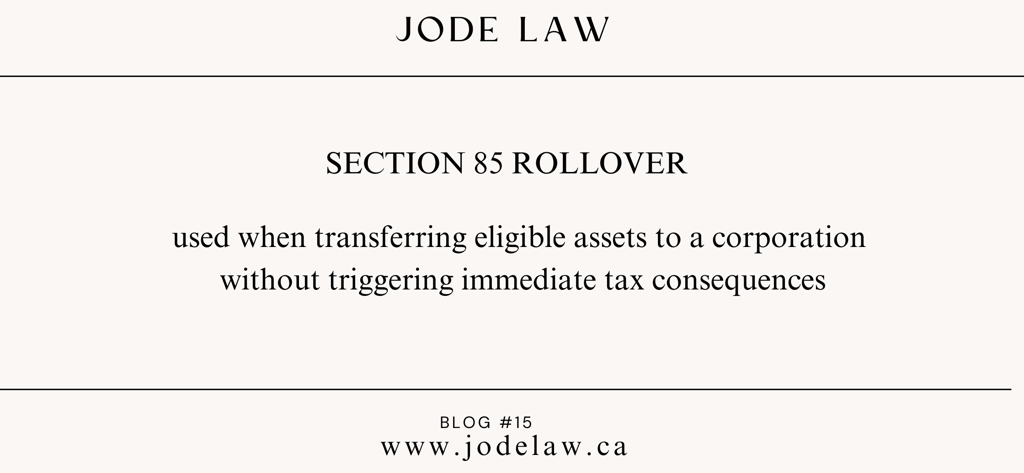
SECTION 85 ROLLOVER
TAX-OPTIMIZED ROLLOVERS


Section 85 Rollover | Defer Taxes
A section 85 rollover is a specialized tax strategy available to Canadian taxpayers under Section 85 of the Canadian Income Tax Act (ITA). The provision allows Canadian taxpayers to defer taxes when transferring eligible assets to a corporation or partnership. It enables tax deferral on income that would have been taxed upon asset transfer. The transfer is made using a section 85 election Form T2057. The election allows a complete rollover (no immediate gain) or partial rollover (some immediate gain), depending on the “elected amount” on the transfer. This means the provision allows taxpayers to defer tax on the assets transferred when in fact, tax should have been triggered. This deferral can be advantageous for taxpayers who anticipate future business growth and want to preserve capital for reinvestment. The tax will then be triggered on the eventual sale of the assets.
We see small businesses use this provision often. For example, if you are a sole proprietor, and decide to incorporate your business, you may want to transfer some of the assets you held in your name as a sole proprietor into your corporation. This transfer would ordinarily be deemed as a sale to the corporation and taxes would be triggered on the capital gains. To defer such tax, a Section 85 rollover would be your go-to provision. In the rollover transaction, you will be deemed the vendor or transferor and your new corporation the purchaser or the transferee.
When transferring to a corporation, a portion of the consideration must include shares. The fair market value of the transferred eligible asset must equal the fair market value of the consideration paid to the transferor.
Rollovers are used in different situations. From private small business transactions to large, public transactions. It can be used to transfer assets from a proprietorship to a corporation, to transfer shares of an operating company to a holding company and to assist with the consideration in the sale of a business.
Am I Eligible for Section 85 Rollover?
To utilize the provisions of Section 85 of the ITA, the transferor and transferee must meet specific conditions. Both parties must be Canadian taxpaying residents at the time of the rollover. Taxpayers in this context could be individuals, corporations or trusts. Additionally, the assets being transferred must qualify as eligible properties, which include capital property, inventory, or intangible assets, such as goodwill. The transferor and transferee should execute a rollover agreement prepared by their legal counsel, indicating the specific assets, and elected price.
Filing Requirements
When implementing Section 85 rollover, the transferor and transferee must elect the amount of consideration/payment received in exchange for the transferred assets and then file Form T2057 with the Canada Revenue Agency (CRA). Form T2057 notifies CRA about the rollover provisions used in the transfer. The transferor and transferee must keep records of the transaction, including asset descriptions, values, and supporting legal documentation.
In summary, the Section 85 rollover provision under the Canadian Income Tax Act offers significant advantages for Canadian taxpayers seeking to transfer assets to a corporation. Proper legal documentation, an understanding of eligibility, and compliance requirements are required for taxpayers to leverage this provision. Consulting with a qualified legal and tax professional is advisable.
-----------
- Jumi Odepe, Principal Lawyer, Jode Law
The business lawyers at Jode Law understand that the Canadian business law landscape could be complex. If you want to optimize the provisions of Section 85 of the ITA, contact our business lawyers today via email at lawyers@jodelaw.ca
The articles published by Jode Law are intended as general information only and do not serve as legal advice. By reading, the reader understands there is no solicitor-client relationship established. If you have a legal question, you may consult one of our lawyers via email at lawyers@jodelaw.ca or use the Contact Us button to drop a message.
